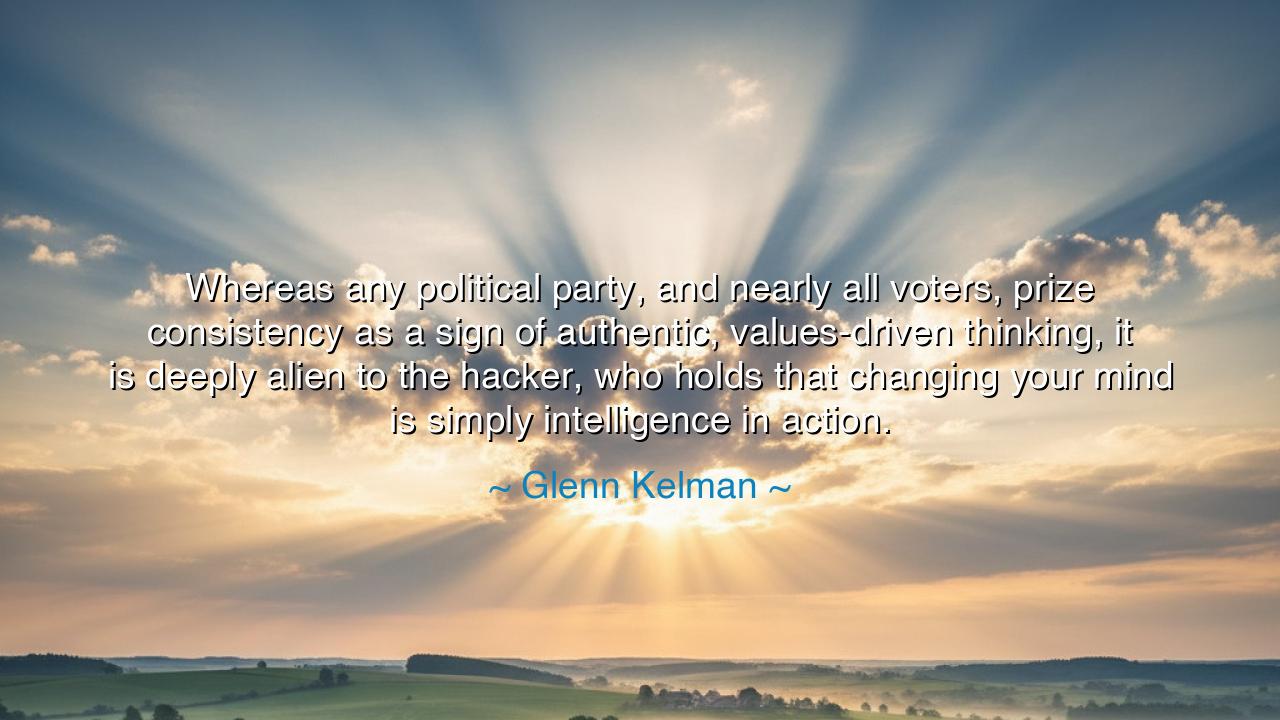
Whereas any political party, and nearly all voters, prize
Whereas any political party, and nearly all voters, prize consistency as a sign of authentic, values-driven thinking, it is deeply alien to the hacker, who holds that changing your mind is simply intelligence in action.






The words of Glenn Kelman ring with the tone of a prophet observing the tides of human thought: “Whereas any political party, and nearly all voters, prize consistency as a sign of authentic, values-driven thinking, it is deeply alien to the hacker, who holds that changing your mind is simply intelligence in action.” In this saying lies a clash between two ancient forces — the yearning for certainty, and the reverence for change. The former seeks safety in sameness, a fortress of unshaken belief; the latter sees wisdom in the shifting winds, understanding that only the fool clings to a single map while the landscape transforms beneath his feet.
In ages past, men equated consistency with honor. A ruler who changed his word was seen as weak, a philosopher who altered his creed was branded untrustworthy. Yet the hacker, child of a new age, stands apart. To him, consistency is not virtue but inertia. He sees the world not as fixed marble but as living clay — to be reshaped as knowledge grows. Just as fire refines iron, so does experience refine the mind. The hacker’s creed is not “I am right,” but “I am learning.” To change one’s mind is not betrayal, but evolution; not retreat, but progress.
Consider the story of Charles Darwin, who began his voyage upon the Beagle as a believer in the divine immutability of species. Yet as he gazed upon the islands of the Pacific, saw finches shaped by their terrain, and fossils of ancient beasts, his faith in that old certainty melted away. Many would have called him inconsistent, even treacherous to the teachings of his youth. But in truth, his willingness to change his mind birthed a revelation that altered humanity’s understanding of life itself. He dared to be intelligent in action — to question even his own convictions.
So too did Socrates, the gadfly of Athens, refuse to stand still in thought. When men accused him of corrupting youth with questions, he answered, “The unexamined life is not worth living.” He knew that to seek truth is to wander endlessly, revising one’s steps, admitting ignorance. The wise do not cling to opinions like armor; they wield doubt as a sword, cutting through illusion. In this way, changing the mind becomes an act of courage — not cowardice.
Yet, beware: not all change is wisdom. To be blown about by every wind is not intelligence, but confusion. The hacker’s flexibility is not chaos; it is governed by curiosity, by logic, by truth-seeking. He does not abandon values — he refines them. His authenticity lies not in stubborn adherence to the old, but in loyal service to the real. Just as a sailor adjusts his sails to reach the same destination amidst shifting winds, so the thinking mind adjusts its course to reach truth amidst the storms of new evidence.
The lesson is clear: let your beliefs be like trees — rooted in integrity, yet bending with the storm. Do not mistake stillness for strength. The oak that refuses to sway is the first to break. Instead, live as the reed, supple and enduring, yielding when wisdom calls you forward. The brave are not those who never doubt, but those who dare to learn, unlearn, and learn again.
In your own life, practice this art of intelligent change. When you meet new ideas, do not guard your mind as a fortress; open it as a temple. Question your assumptions, listen deeply, seek evidence, and if truth demands it — transform. Keep a journal of your evolving thoughts; record what you once believed, and how you grew beyond it. Revisit old opinions as a craftsman revisits his tools, sharpening them with time. To live thus is to remain forever young in spirit — a student of the infinite.
And so, remember: consistency may comfort the fearful, but growth crowns the wise. To change your mind when reason calls is not to lose yourself, but to find yourself anew. For in that sacred act — that humble surrender to truth — you become what all thinkers, all creators, all hackers aspire to be: not a monument of fixed belief, but a living flame of intelligence in action.






AAdministratorAdministrator
Welcome, honored guests. Please leave a comment, we will respond soon